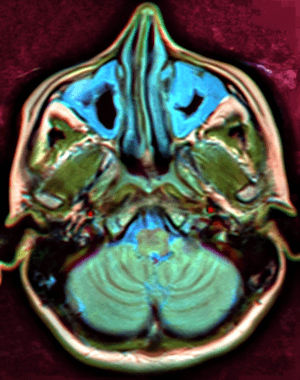Sinusitis facts for kids
Sinusitis is when the air-filled spaces inside your face bones, called sinuses, get swollen or infected. This can make you feel unwell with symptoms like a stuffy nose, thick snot, and pain in your face.
Contents
What Are Sinuses?
Your head has several hollow, air-filled spaces called sinuses. They are found in the bones around your nose and eyes. Sinuses help make your head lighter and make your voice sound better. They also produce mucus, a sticky liquid that helps trap dust and germs from the air you breathe. This mucus then drains into your nose.
What Causes Sinusitis?
Sinusitis often happens after you have a cold or the flu. When you have a cold, the lining of your sinuses can swell up. This swelling can block the small openings that let mucus drain out. When mucus gets trapped, germs like bacteria or viruses can grow there, leading to an infection.
Other things can also cause sinusitis:
- Allergies: If you have allergies, they can make your sinuses swell and block up.
- Nasal polyps: These are small, soft growths inside your nose or sinuses that can block the drainage.
- Deviated septum: This is when the wall between your nostrils is not straight, which can make it harder for sinuses to drain.
How Do You Know If You Have Sinusitis?
The symptoms of sinusitis can be uncomfortable. Here are some common signs:
- Stuffy or blocked nose: It feels hard to breathe through your nose.
- Thick mucus: You might have yellow, green, or cloudy snot coming from your nose or dripping down the back of your throat.
- Face pain or pressure: This pain can be around your eyes, forehead, or cheeks. It might feel worse when you bend over.
- Headache: Sinusitis can cause headaches, especially in the front of your head.
- Cough: Mucus dripping down your throat can make you cough, especially at night.
- Sore throat: The dripping mucus can also irritate your throat.
- Tiredness: You might feel very tired or run down.
- Fever: Sometimes, you might have a slight fever.
How Is Sinusitis Treated?
Most cases of sinusitis get better on their own, especially if they are caused by a virus. However, some treatments can help you feel more comfortable:
- Pain relievers: Medicines like ibuprofen or acetaminophen can help with pain and fever.
- Nasal sprays: Saline (saltwater) nasal sprays can help rinse out your nasal passages and keep them moist.
- Warm compresses: Placing a warm, damp cloth on your face can help ease pain.
- Steam: Breathing in steam from a warm shower or a bowl of hot water can help loosen mucus.
- Antibiotics: If a doctor thinks bacteria are causing your sinusitis, they might prescribe antibiotics. These medicines only work for bacterial infections, not viral ones.
- Decongestants: These medicines can help reduce swelling in your nose and sinuses, making it easier to breathe. They should only be used for a few days.
If your sinusitis keeps coming back or lasts a long time, it's called chronic sinusitis. In these cases, a doctor might suggest other treatments or tests to find out why it's happening.
Images for kids
See also
 In Spanish: Rinosinusitis para niños
In Spanish: Rinosinusitis para niños
 | Charles R. Drew |
 | Benjamin Banneker |
 | Jane C. Wright |
 | Roger Arliner Young |



